Sagadahoc Stories #80: 2/22/99
Getaway
It ain't easy to escape the higher latitudes in February, at least
via American Airlines. Our Saturday morning flight was canceled,
and each subsequent substitution got sicked out until Monday at
dawn. Running late and groggy we stumbled into the seething crowds
at Logan's American check-in just before flight time. Barely managed
to scuttle aboard our bird to.. Dallas?
Ah, Dallas. We got to spend 7 hours admiring the terminal, and
soaking up cosmopolitan ambiance. Some indigestible food, too.
I entertained myself sketching fellow sufferers, until they got
nervous, while Peggy read a pop novel about the Mississippian
culture at Cahokia circa AD 1200 (People of the River). Peggy
goes for the history, I draw the action: just like being back
on sabbatical.
|
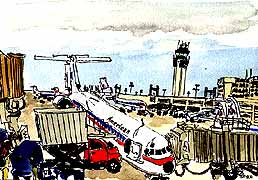
Fly American
|
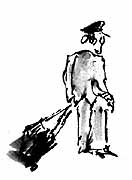
|
Almost. Air travel reminds you how independent most modern life
is, at least in the boonies. Go your own way when you care to.
Putting yourself into the hands of airline technicians, becoming
a cog in the machinery, a warm body with a wallet, is mildly dissociative.
Sandwiched into minimal seating, just more grist in the sausage
factory of the good life. It means you can slide back into the
observer mode, though, and watch yourself making ritual moves.
|

|
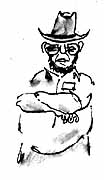
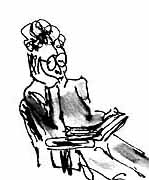
|
Our moves had us shuttling from one end of the American hub to
the other, as we tried to get on the next flight to San Juan.
Got so we recognized fellow travelers as we schlepped from gate
to gate. We discovered that once you are through security and
holding a ticket to a destination, gate agents have the power
to put you on any plane going that way, if there's a seat, and
you're sufficiently respectful. American was still juggling flights,
and the agents had bourn the brunt of passenger anger. Now they
were tired and wore fixed smiles. We were especially nice to them. |
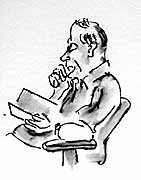
|

After the last flight of the day got delayed the third time, an
agent announced that the movie would be free, "and there will
be a two drink minimum." We cheered. Redfaced, she corrected herself,
"MAXIMUM, catering is running low." We laughed. When the ramp
door opened, Puerto Ricans mobbed the departure access, despite
all pleas for single lines, and we sardined ourselves into a widebody
winging to the sun.
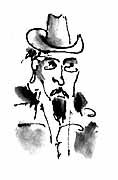
|
My seat neighbor, Rick, was an insurance salesman from Dallas
who wanted to yarn. An American brought up in "Dominica", he found
his Spanish useful selling group insurance to companies in Puerto
Rico. He sounded pure Texas to me. When we told him we were headed
to the Copa Marina in Guanica, he was voluble in its praise. Gave
us all sorts of tips, about remote beaches and local amenities.
"I'm probably the only other person on the plane who's ever heard
of the place," he said. "It's way out there." |
It certainly is, as we discovered at 2AM when we careened around
the last hairpin curve, after a white knuckle ride across the
island in the resort van. Terry and Viv, our English cousins,
who'd been expecting us for days, had stayed up to actually lay
eyes on us, and we hugged and staggered off to bed. Welcome to
Paradise.
An uproar of parrots brought us to the surface at sunrise, but
we dove back down, and didn't totter into the light until the
sun was high. And wonderfully hot. We got into languid resorter
mode immediately. Gentle breezes. Moving the chaises to follow
the shade. " An iced rum and mango, porfavor?" Peggy kept slipping
back into the pool for another few laps. "Pass the lotion." You
know the drill.
|
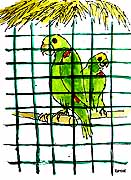
Parrots
|
Terry and Viv had been caged in this outpost for almost a week,
and were eager to roam the island, but they patiently waited while
we soaked and uncoiled. They'd already explored the surrounding
dry forest, a UN designated world protection area, noted for its
unique ecology, and found the hidden beaches Rick had promised
us. And learned that the resort prices for food and drink were
on the high side, as Rick had warned. They wanted to rent a car,
and see some of Puerto Rico. But first, "How about the pina colata?"
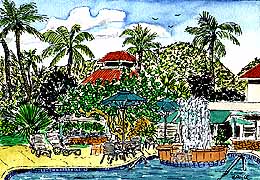
Copa Marina
|
Utter indolence. Waving palms. Siesta at midday. Alto stratus
when the sun gets too hot. A paddle in the warm Caribbean. Some
kind of a February dream for hunched Mainers. Sharp stars in a
warm night. Latin jazz guitar on the patio. A dry coast with no
bugs. The children well-behaved. Who wrote this script, anyway? |
Sitting still and being waited on are guaranteed to make me nervous,
but the usual discomforts of noblesse weren't in evidence. No
Ugly Americans, no puffed up ricos, no fawning staff looking for
gratuities. Copa Marina is a very middleclass place. Lots of Puerto
Ricans, family groups, people who looked like they'd earned their
vacations and weren't putting on the snob. The resort was clean,
handsome, and well run. The staff looked to be enjoying their
work without classism. Quite remarkable, considering the economy
outside the fence.
| When we did get a rental car and retrace the hairpins into Guanica,
it was a very different world. Shabby, dusty, down at heel, full
of chickens, junk cars, and feral dogs. But not desperately depressed
like Mississippi river towns, or looking to sell you trinkets,
like the Baja. Tidy little cinderblock houses in gaudy pastels
with tin roofs and iron scrollwork facades next to crumbling old
cement stuccoes with rusty rebar jutting out. New Toyotas next
to trashed beaters with no headlights. Gorgeous tropical flowers
next to stacks of plastic water jugs. Horses staked out next to
scrap metal yards. Men sitting at outdoor cantinas in the middle
of the day. Schoolgirls in cotton plaid uniforms. Class boundaries
were hard to decipher. Class distinctions seemed unoppressive.
Maybe there were rico ricos on top of the big hills, or on the
north coast, but down on the southwest fringe of the island there
looked to be a rough economic equality. Just plain poor. |
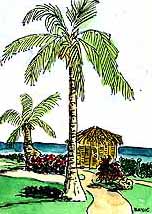
Paradise
|

|
Our first excursion took us to Ponce, the island's second city,
sprawled over a wide valley between the mountains and the sea.
The day before had been Carnival, and when we wended our way to
the city center it looked like the morning after. Very Spanish.
Cathedral at the center. Narrow streets radiating from the square.
Lots of ironwork and crumbling facades. Stageset for La Revolution. |
|
We hadn't gone 30 feet from the car when we were stopped by a
couple from Brooklyn who asked if we'd fill out a party for a
trolleybus ride. The driver wouldn't take just two riders, and
we were the only other tourists in sight.
"Sure, we'll split the fee," we said.
"No, no. It's free." |
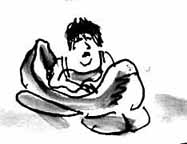 |
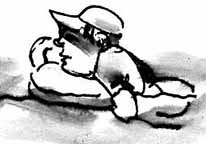 |
More than free. Hector, our guide and driver, was a treasure.
What set out to be a 40 minute tour of the city ended up as a
2 hour excursion, with Hector following up every expressed interest
with an enthusiastic side trip. We had to get out and see the
800 year old tree, drive to the top of Castle Hill to get the
full panorama, clamber over a fence to get seed pods as souvenirs.
It was dark by the time we careened back to the city center. When
we asked Hector about a good restaurant he led us down a side
street to the bistro door. |
| Just before we got there a voice called from across the street,
"Bryce?" It was Rick, our fellow air traveler, and he joined us
for a beer and more tales. The plot gets more implausible all
the time. |
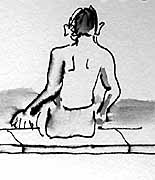
|
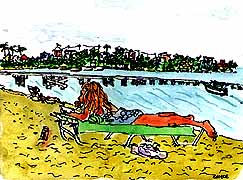
Suntan
|
And is hard to escape. The locals must use the roadsigns in Puerto
Rico for metalwork projects, because complete directionals are
few and far between. We went round and round trying to get out
of Ponce. Going down one ways the wrong way. Having near misses
on blind turns. Our own little Carnival. When we finally got back
on the Dos headed west, even the stock car slalom driving was
a relief. |
Driving in Puerto Rico explains a lot about New York traffic.
There's a definite island style, with two modes. Dead slow oblivious,
and full tilt dodgem. You stay in whatever lane pleases you, and
everyone else threads the needle around you. I immediately recognized
this ordinary Puerto Rican pattern as the wild card element up
in the Big Apple. And the island is thoroughly automoted. We never
saw a bus, and none of the roadside pedestrianism of Mexico. It
looks like you can keep anything that runs on the road, and the
roads are paved and lighted to the hilltops. Coming across in
the night it was strange to see streetlights figuring the hills,
even where there were no houses to be seen. Rural electrification
for automotion. There seem to be hefty tolls every few miles on
the highways, and paving crews everywhere.
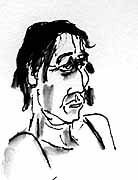
|
That's how our days went. A bit of hiking in the cactus groves,
dip in the salt, loll under the palms, a drive around. And lots
of laughter. Terry's mum and mine, Peggy and Pam, must have been
fun sisters to be around. Their manner of having you on still
bubbles up between the cousins. That's what you do with distant
relations you too rarely see: you bring back those who've gone.
The left us laughing, but too soon.
|

|
If we had a complaint, it was the lack of fresh fruit and vegetables.
We'd expected all sorts of garden truck, but didn't even seen
any kitchen gardens by the houses. The seafood was good, though,
especially the red snapper and the conch. And the beans and rice.
This part of Puerto Rico isn't touristed enough to have spawned
a lot of fancy restaurants, or craft shops. In fact we didn't
see any arts and crafts at all. It was very reminiscent of Newfoundland
in the 70s. Subsisting on the skirts of an industrial giant. Full
of junk cars. Who would want something handmade, or old, when
you could get new and shiney?

Palms
|
Thursday we drove to Mayaguez. Or at least we set out to. But
I missed the first turn after Guanica, and the road signs did
the rest. Fortunately the sun was out, so we navigated by sky
sign, doing loop-the-loops across southwest Puerto Rico. Winding
up steep hillsides, plunging into village mazes, going through
banana plantations and cattle pasturage. We were told that sugar,
coffee, oranges, watermelon, and plantain were the big crops here,
but we might have thought it was chickens and stray dogs. Industrial
activity, when we encountered it, wore none of the cosmetic disguise
we've come to take for granted. Rusting, rotting, crumbling, the
factories jutted up out of the rank vegetation like an unpainted
capitalist nightmare. In Guanica huge grain silos lined the waterfront,
filled with imported chickenfeed. Along the Dos a forest of stacks
and cracking towers marked where nylon was being made for the
Hanes factory. The reek of a rum distillery wafted over Ponce
airport. Mayaguez, when we finally found it, at sunset, was a
grim city, roughed up by hurricane Mitch, full of false turnings
and industrial alleys. |
Back on the Dos it was all franchise fast food and modern malls.
Like stumbling out into America. Puerto Rico is like that. Third
world poor one minute with birds of prey circling overhead, mainstream
US the next with neon signs. But the Puerto Ricans don't seem
to mind the disparities. We were well treated everywhere, by friendly
people using their schoolhouse English. Although all the signs
and street talk is Spanish, almost everyone we encountered could
help us in Yankee-speek. Maybe it's living where the weather is
perfect, but we saw none of the ghetto despair or rural depression
we've come to associate with poverty. Just people living their
lives under a warm sun at their own sweet pace. Must drive the
entrepreneurs nuts.
We had to head back to the nuthouse, though. Saturday morning
Peggy took her last swim, we kissed the cousins, hung on while
Giovanni hot rodded across the mountains, and spent fourteen hours
doing the airport thing: San Juan to Miami to Logan. Put on some
serious clothes in the terminal. Retrieved the Owl. Finally pulled
up the frozen drive at quarter to midnight.
|
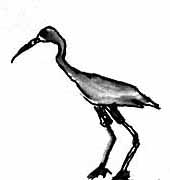
|
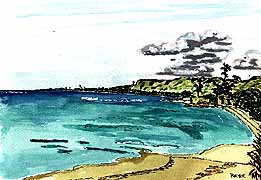
Far Beach
|
I discovered I hadn't listened to a shred of news, or thought
about Bowdoinham once the entire journey. The complete escape.
In our house the room dimensions and the stark white walls were
strangely unfamiliar. Good to give yourself a little distance.
When you get back you realize what's important. The stuff that
happens between people, not the stuff we pile up around us. Our
connection to a place. Good to be home. |




















